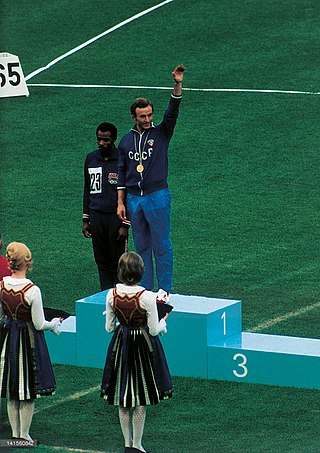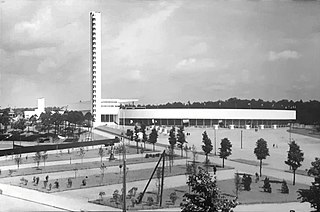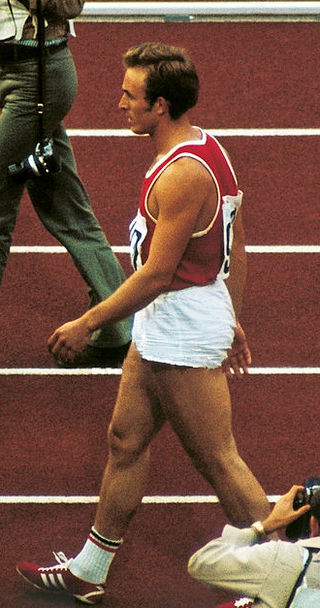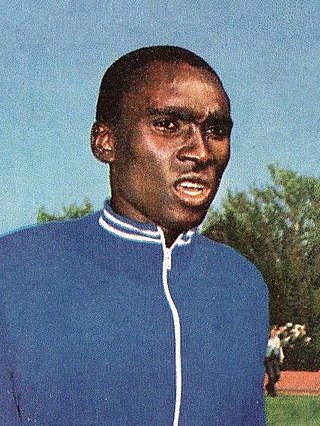
The men's 200 metres at the 2000 Summer Olympics, as part of the athletics programme, was held at Stadium Australia on Wednesday 27 September and Thursday 28 September 2000. There were 67 competitors from 50 nations. The event was won by Konstantinos Kenteris of Greece, the nation's first medal in the event. Darren Campbell's silver was Great Britain's first men's 200 metres medal since 1980 and matched the nation's best result in the event. Ato Boldon of Trinidad and Tobago repeated as bronze medalist, the ninth man to earn multiple medals in the 200 metres.

The men's 200 metres was the second-shortest of the men's track races in the Athletics at the 1964 Summer Olympics program in Tokyo. 63 athletes from 48 nations entered, with 6 not starting in the first round. The maximum number of athletes per nation had been set at 3 since the 1930 Olympic Congress. The first two rounds were held on 16 October, with the semifinals and the final on 17 October. The event was won by 0.2 seconds by Henry Carr of the United States, the nation's 11th victory in the event. Fellow American Paul Drayton took silver; it was the fifth time in six Games that the United States had the top two finishers. Edwin Roberts gave Trinidad and Tobago its first medal in the men's 200 metres with his bronze.

The men's 200 metres was a track and field athletics event held as part of the Athletics at the 1912 Summer Olympics programme. It was the fourth appearance of the event, which has appeared at every edition of the Summer Olympics since the 1900 Summer Olympics. The competition was held on July 10, 1912, and on July 11, 1912. 61 runners from 19 nations competed. NOCs could enter up to 12 athletes. The event was won by Ralph Craig of the United States, the nation's third victory in four Games. Another American, Donald Lippincott, took silver. Great Britain earned its first medal in the 200 metres with Willie Applegarth's bronze.

The men's 200 metres at the 1988 Summer Olympics in Seoul, South Korea had an entry list of 72 competitors from 59 nations, with ten qualifying heats (72), five quarterfinal races (40) and two semifinals (16), before the final (8) took off on Wednesday September 28, 1988. The maximum number of athletes per nation had been set at 3 since the 1930 Olympic Congress. The event was won by Joe DeLoach of the United States, beating his teammate and defending champion Carl Lewis by 0.04 seconds in the final. The defeat ended Lewis's hopes of repeating his 1984 quadruple, despite running the final under his own Olympic record time. It was the United States' 14th victory in the men's 200 metres. Lewis was the seventh man to win multiple medals in the event, matching Andy Stanfield for the best result to that point. Robson da Silva earned Brazil's first medal in the event with his bronze.

The men's 200 metres was an event at the 1928 Summer Olympics in Amsterdam. It was held on 31 July and 1 August 1928 at the Olympic Stadium. There were 59 competitors from 29 nations. Nations had been limited to 4 athletes each since 1920. The event was won by 0.1 seconds by Percy Williams of Canada, the nation's second victory in the event. The win broke a streak of three victories by the United States; with no Americans on the podium, the nation's six-Games medal streak was broken as well. Walter Rangeley of Great Britain took silver, giving Great Britain a four-Games medal streak in the event. Germany earned its first men's 200 metres medal with Helmut Körnig's bronze.

The men's 200 metres was an event at the 1992 Summer Olympics in Barcelona, Spain. There were 79 participating athletes from 65 nations, with eleven qualifying heats. The maximum number of athletes per nation had been set at 3 since the 1930 Olympic Congress. The event was won by 0.12 seconds by Michael Marsh of the United States, the nation's third consecutive and 15th overall victory in the event. The Americans would take a second medal for the third consecutive Games as well, this time with Michael Bates earning bronze. The silver medal went to Frankie Fredericks, taking Namibia's first medal in the men's 200 metres.

The men's 200 metres event was part of the track and field athletics programme at the 1924 Summer Olympics. The first two rounds were held on 8 July, with the semifinals and final on 9 July. Sixty-five sprinters from 33 countries competed. Nations were limited to 4 athletes each. The event was won by 0.1 seconds by Jackson Scholz of the United States, the nation's third consecutive victory in the event and fifth in six Games. For the third straight Games, the podium consisted of two Americans winning gold and silver and a Briton taking bronze. Paddock, the silver medalist in 1920 as well, was the second man to earn multiple medals in the 200 metres.

The men's 200 metres was held on 2 September and 3 September as part of the athletics at the 1960 Summer Olympics, which were held in Rome. 74 athletes from 54 nations entered, but only 62 athletes from 47 nations ultimately competed. The maximum number of athletes per nation had been set at 3 since the 1930 Olympic Congress. The event was won by 0.1 seconds by Livio Berruti of Italy, the first victory in the event by a nation outside of North America and snapping a five-Games winning streak by the United States. The Americans finished with a silver medal, by Lester Carney, to extend their medal streak to six Games. Abdoulaye Seye of France took bronze. Berruti's gold and Seye's bronze were the first medal for their nations in the men's 200 metres.
The men's 100 metres sprint event at the 1932 Summer Olympics in Los Angeles, California, United States, were held at the Los Angeles Memorial Coliseum on July 31 and August 1. Thirty-three runners from 17 nations competed. The 1930 Olympic Congress in Berlin had reduced the limit from 4 athletes per NOC to 3 athletes.
The men's 100 metres sprint event at the 1936 Olympic Games in Berlin, Germany, were held at Olympiastadion on 2 and 3 August. The final was won by 0.1 seconds by American Jesse Owens, and teammate Ralph Metcalfe repeated as silver medalist. Tinus Osendarp of the Netherlands won that nation's first medal in the men's 100 metres, a bronze.

The men's 200 metres sprint event at the 1936 Olympic Games took place between August 4 and August 5. There were 44 athletes from 22 nations competing. The maximum number of athletes per nation had been set at 3 since the 1930 Olympic Congress. The final was won by 0.4 seconds by American Jesse Owens, with silver going to Mack Robinson. Owens thus reached 3 gold medals in 1936, with the sprint relay still to come. The Netherlands earned its first medal in the men's 200 metres with Tinus Osendarp's bronze.

The men's 400 metres hurdles event at the 1936 Summer Olympic Games took place on August 3 and August 4. There were 32 competitors from 20 nations. The maximum number of athletes per nation had been set at 3 since the 1930 Olympic Congress. The final was won by American Glenn Hardin. After two Games of silver and bronze medals, it was the United States' first victory since 1920 and sixth overall. However, it was the first time since 1900 that the Americans had only one medalist in the event. John Loaring took Canada's first 400 metres hurdles medal since 1900 with his silver. Miguel White gave the Philippines a bronze in its 400 metres hurdles debut.
The men's 400 metres sprint event at the 1936 Olympic Games took place in early August. Forty-two athletes from 25 nations competed. The maximum number of athletes per nation had been set at 3 since the 1930 Olympic Congress. The final was won by 0.2 seconds by American Archie Williams, the third consecutive and seventh overall title in the event for the United States. Godfrey Brown's silver was Great Britain's first medal in the event since 1924.

The men's 400 metres sprint event at the 1948 Olympic Games took place between August 4 and August 5. Fifty-three athletes from 28 nations competed. The maximum number of athletes per nation had been set at 3 since the 1930 Olympic Congress. The final was won by 0.2 seconds by Jamaican Arthur Wint coming from almost 10 meters back to catch teammate and world record holder Herb McKenley. This was Jamaica's first Olympic gold medal in their debut participation at the Games, and broke a string of 3 straight American victories in the men's 400 metres.
The men's 400 metres sprint event at the 1932 Olympic Games took place on August 4 and August 5 at the Los Angeles Memorial Coliseum. Twenty-seven athletes from 15 nations competed. The 1930 Olympic Congress in Berlin had reduced the limit from 4 athletes per NOC to 3 athletes. The event was won by Bill Carr of the United States, that nation's second consecutive title and sixth overall in the event. Ben Eastman's silver marked the first time countrymen had gone one-two in the event since the United States did it at the first three Olympics.

The men's 400 metres hurdles event at the 1932 Olympic Games took place on July 31 and August 1 at the Los Angeles Memorial Coliseum. There were 18 competitors from 13 nations. The 1930 Olympic Congress in Berlin had reduced the limit from 4 athletes per NOC to 3 athletes. The event was won by Bob Tisdall of Ireland, the nation's first medal in the event in its 400 metres hurdles debut. The United States took silver and bronze, extending its streak of taking at least silver in all 7 appearances of the event to that point. Taylor became the first man to earn three medals in the event, adding to his 1924 gold and 1928 bronze. Defending champion David Burghley of Great Britain finished fourth.

The men's 100 metres sprint event at the 1972 Olympic Games in Munich, West Germany, was held at Olympiastadion on 31 August and 1 September. Eighty-five athletes from 55 nations competed. Each nation was limited to 3 athletes per rules in force since the 1930 Olympic Congress. The event was won by Valeriy Borzov of the Soviet Union, the first medal in the men's 100 metres for that nation. Jamaican Lennox Miller, silver medalist four years earlier, became the second man to make the podium twice in the event by taking bronze.

The men's 200 metres sprint event at the 1952 Olympic Games took place between July 22 and July 23. There were 71 competitors from 35 nations. The maximum number of athletes per nation had been set at 3 since the 1930 Olympic Congress. The final was won by 0.16 seconds by American Andy Stanfield. Americans also took silver and bronze as the United States swept the medals in the event for the third time.

The men's 200 metres was an event at the 1972 Summer Olympics in Munich. The competition was held on 3–4 September. There were 57 competitors from 42 nations. The maximum number of athletes per nation had been set at 3 since the 1930 Olympic Congress. The event was won by 0.19 seconds by Valeriy Borzov of the Soviet Union, the nation's first medal in the event. Larry Black took silver, extending the United States' podium streak in the men's 200 metres to nine Games. Italy earned its first medal in the event since 1960 with Pietro Mennea's bronze.

The men's 400 metres hurdles was an event at the 1972 Summer Olympics in Munich. The competition was held on 31 August - 2 September. There were 37 competitors from 25 nations. The maximum number of athletes per nation had been set at 3 since the 1930 Olympic Congress. The event was won by John Akii-Bua of Uganda, the nation's first medal in the event and first gold medal in any Olympic event. Ralph Mann returned the United States to the podium after a one-Games absence with his silver medal, while David Hemery added a bronze to his 1968 gold to become the fifth man to earn multiple medals in the event while extending Great Britain's podium streak in the 400 metres hurdles to three Games.















